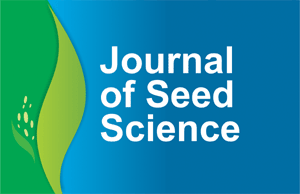This study has aimed to evaluate the best time to harvest squash seeds and verify the effect of fruit storage on protein activity and in the physiological quality of 'Jabras' squash hybrid seeds. The fruits were harvested at 15, 30, 45, 60 and 75 days after anthesis (DAA). In every period, thirty fruits were harvested and fifteen had their fruit extracted immediately after harvesting, and the other fifteen fruits were stored for twenty days in plastic boxes under shade conditions, and only after this period the seeds were extracted. Seed quality was evaluated for the following parameters: moisture content, germination, first count, germination rate, seedling emergence, emergence rate, seed mass and seedling dry matter. Also, the electrophoretic profile analysis of heat-resistant proteins (Late Embryogenesis Abundant - LEA) was performed. Seed physiological maturity occurred in fruits harvested at 60 days after anthesis and stored for 20 days. During this period, seeds reached the maximum dry matter, maximum germination and vigor, and a high concentration of LEA proteins.
Cucurbita maxima; Cucurbita moschata; seed quality

 Thumbnail
Thumbnail
 Thumbnail
Thumbnail
 Thumbnail
Thumbnail
 Thumbnail
Thumbnail
 Thumbnail
Thumbnail
 Thumbnail
Thumbnail
 Thumbnail
Thumbnail






